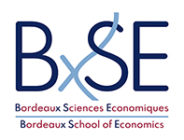The Development, Cities, Inequality (DCI) programme focuses on the analysis of economic and social development issues, urban and territorial dynamics, individual behaviour and inequalities. Much of the research carried out within the programme focuses on the specificities of developing economies.
Poverty reduction has been underway for several decades, but the development challenges remain significant. They affect all aspects of life (health, food, well-being, equity, freedom, security, etc.) as well as human environments and the upheavals of the anthropocene (urbanisation, adaptation to global warming, migration, etc.). The DVI programme proposes a research agenda built around these issues and questions and brings together two of the historical themes of economics in Bordeaux: development economics and spatial and urban economics.
In recent years, Bordeaux researchers in development economics have acquired a high profile in the analysis of behaviour, the economics of agriculture, the study of inequalities and social stratification, the economics of the family,
the analysis of informal activities and the evaluation of redistribution policies, to name but a few. This work covers a wide range of fields: Africa (Senegal, Ethiopia, Burkina Faso, Côte d’Ivoire, Madagascar, etc.), Latin America (Brazil, Colombia, Mexico, etc.) and Asia (China, India, Nepal, Vietnam, etc.).
The three research themes developed in Spatial and Urban Economics are: regional and urban development, from small and medium-sized towns to metropolises, the land and property economy and the economy of mobility, both from the point of view of individual behaviour and sustainable mobility policies. These themes, developed in an applied economics approach, are intended to be extended to urban dynamics in southern countries.
Finally, the programme benefits from the contribution of specialists in normative/ethical economics and psychological and behavioural economics, which will lead to the collective exploration of new fields such as the role of socio-cultural norms and power relations in individual and collective behaviour.
The scientific programme of the DVI programme is structured around three non-exclusive research axes.
The work carried out within the framework of the DVI programme is based on diversified methodological approaches (qualitative and quantitative empirical methods, applied theory associated with structural econometrics, (quasi-)experimental approaches, etc.), an openness to interdisciplinarity and a strong grounding in the field through the production of original data in various contexts. The researchers in the programme also share the desire to inform public decision-makers, to enrich the societal debate and to promote institutional partnerships. The DVI researchers have established rich collaborations with various institutions such as the French Development Agency (AFD), the Institute of Research for Development (IRD), the French Institute of Pondicherry (IFP), Orange Lab, the World Bank, the Center for Equity, the International Food Policy Research Institute (IFPRI), French local authorities and urban planning agencies, etc. They are also regularly involved in innovative research projects (Regional projects, ANR, AFD, etc.). Finally, the DVI programme is a privileged partner of two ‘Major Research Programmes’ (GPR) projects of the University of Bordeaux, namely the HOPE project (Understanding human well-being and behavior for better policies and societies) on issues of behavior and well-being in rich countries and less advanced economies, and the IPORA project (Interdisciplinary policy-oriented research on Africa) encouraging research partnerships on African societies.


